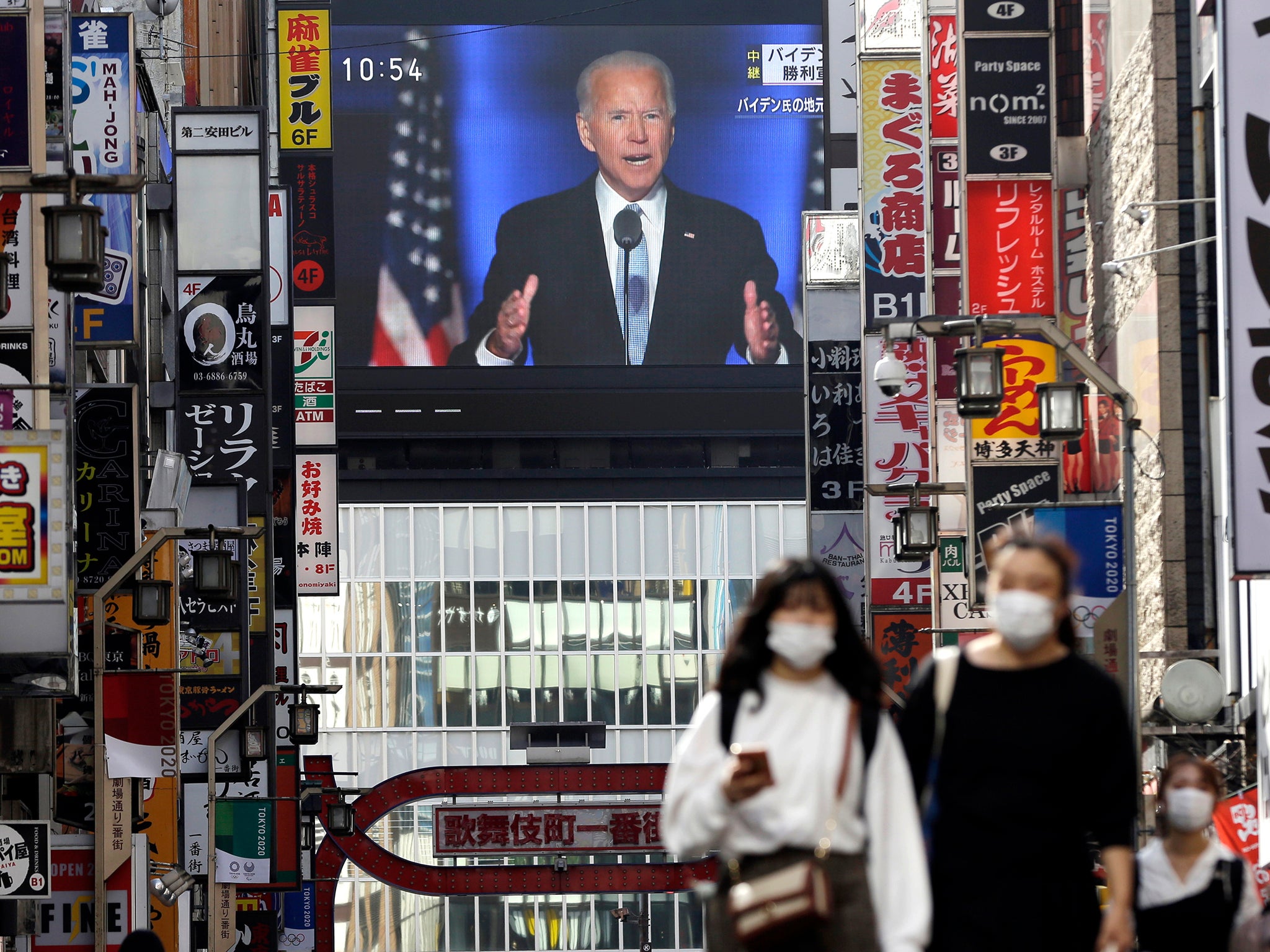The Biden two-step: How nations around the world are scrambling to prepare for a new White House
Analysis: While some nations celebrate the end of a presidency often described as chaotic and incoherent, for others the loss of Trump represents a major check on their ambitions, writes Borzou Daragahi


While every nation in the world has had to adjust to the victory of President-elect Joe Biden in the United States, perhaps no one else had to make as jarring a U-turn as Egytian regime mouthpiece and TV presenter Nashaat El-Deehy.
As the controversy over Mr Biden’s disputed win played out, Deehy smeared him on his show two weeks ago as a “puppet”, comparing the former vice president unfavourably to Donald Trump, who shared warm personal ties with Egyptian ruler Abdel-Fattah Sisi. “[Biden] will be 78 years old on the 20th of this month. That will affect his mental status,” he said. “People say he suffers from Alzheimer’s, and he is not good for the office.”
But minutes later came word that Mr Sisi had congratulated Mr Biden, and Deehy’s tone suddenly shifted. “[Biden] has huge respect for Egypt,” he said, in a clip shared and widely mocked on Egyptian social media. “He is a wise man, a good listener, and he doesn’t make random decisions based on his bad temper like Trump. Trump was violent, stubborn and arrogant.”
As Biden prepares to take office in two months, governments with strong interests in Washington are scrambling to adjust their rhetoric and policies to account for a president who will likely bring about some marked shifts in US foreign policy on matters such as adherence to international human rights norms and strengthening global multilateral institutions.
“We’ve already seen that affecting policy on certain issues,” said Richard Gowan, a United Nations-based representative for the Crisis Group, an international conflict resolution advocacy organisation. “Overall from most of the US allies, there’s clearly been a hope that a Biden admin would re-engage with the UN. The signals have been extremely positive.”
Biden, a longtime former lawmaker who served on the Senate foreign relations committee, will hardly bring about a radical break from the past. He supported the disastrous 2003 US intervention in Iraq, has been hawkish on Russia and China, and staunchly pro-Israel.
“When President-elect Biden moves into the White House and brings a whole group of advisers with him it will be a return of the same people that President Trump ran against in 2016,” US political scientist John Mearsheimer, a professor at the University of Chicago, said in a recent online talk. “These are the stewards of American foreign policy that screwed up enough that President Trump got elected.”
After the election results, there is also a widespread recognition that Trump and his strain of right-wing ideology are more a symptom of a breakdown in centrist politics in the western world than an anamoly.
But Biden has already signalled quick changes. He has announced his intention to rejoin and refund the World Health Organisation, which Trump has dismissed as a pawn of China, and rejoin the Paris climate change accord, as well as re-engage with Iran on the Joint Comprehensive Plan of Action (JCPOA), the 2015 nuclear accord Mr Trump has sought to scuttle. His Democratic Party in general has shown more consistent concern for matters of worldwide human rights and democracy worldwide, as well as protection of women, LGBT+ and ethnic minorities than Trump’s Republican Party.
From the Middle East to Latin America to Asia, some nations have already begun to adjust their ways. Autocracies that viewed Trump’s disdain for human rights appear to be trying to spruce up their images. Regional powers like Saudi Arabia that exploited Washington’s reluctance to rein in the excesses of partners involved in regional conflicts are wrapping up wars. Polluters that took advantage of White House hostility toward climate change science are coming under pressure to reconsider their stances.
Some nations like Brazil, led by the far-right Trump ally Javier Bolsonaro (who has yet to congratulate Biden), appear to be in panic mode. The Brazilian leader, who has hobnobbed with the departing president at Trump’s Mar-a-Lago resort, warned of armed conflict against the US if Biden made good on a suggestion to impose sanctions on the country for its rampant burning of the Amazon rainforest.
“How do we deal with all of that? Diplomacy is not enough. When there is no more saliva, then there must be gunpowder,” he said.
But other countries with close Trump ties have made more subtle and conciliatory adjustments.
Turkey, which enjoyed strong relations with Trump that staved off two sets of financial penalties, has axed a finance minister viewed as a bridge to the White House through Jared Kushner, declined to meet with Trump’s secretary of state, Mike Pompeo, on his recent visit to Istanbul and, after trashing Biden through the media for weeks as too friendly toward ethnic Kurds, begun dredging up photos of him meeting amicably with President Recep Tayyip Erdogan.
Israel, which enjoyed unprecedentedly strong ties to the Trump White House, is set to watch its star fade under a Biden administration, but has yet to hint at any concessions to make the incoming president’s job easier. Israeli prime minister Benjamin Netanyahu has stepped up the demolition of Arab homes and hosted Pompeo in West Bank settlements considered illegal under international law.
Palestinians leaders, who severed ties to a Trump White House viewed as unbendingly hostile to their interests, have resumed security cooperation with Israel and voiced willingness to adjust policies that irk the US, including payments to the families of those convicted of terrorism offences.
Iran, which has been in a nasty and occasionally personal war of words with the White House since Trump took office, has voiced optimism about the incoming Biden administration.
“The new administration in America will return to adhering to rules to the extent it had adhered to them,” Iranian president Hassan Rouhani said in a cabinet meeting this week. “Earlier administrations, too, did not adhere to all rules, but [the Trump administration] was a lawbreaker.”
Still, even as Iran has offered cautious optimism about a potential return to the nuclear deal, it has upped its nuclear programme in a possible effort to win leverage in any future negotiations.
Similarly, Egypt’s Sisi, described by Trump as “my favourite dictator”, was the first Arab leader to congratulate Biden on his victory. He announced the release of hundreds of political prisoners and hired lobbyists in Washington close to the president-elect’s political party.
But he also launched a crackdown on Egypt’s most prominent human rights group, the Egyptian Initiative for Personal Rights, with arrests of the organisation’s researchers that have been condemned by the State Department, European Union and Senator Elizabeth Warren of the US.
“There’s some effort to signal, at the same time they’re not stopping the repression,” says Timothy Kaldas, a researcher at the Tahrir Institute, a Washington think tank. “It’s clear the Egyptian government cares about what the Biden administration thinks and how they will engage with Egypt.”
Gowan, at the UN, said governments had been counting on a potential Biden win for months and hedging their bets by shifting their policies. He cited a months-long Saudi push to end its disastrous and unpopular Yemen war and the UN Security Council’s rejection of a White House scheme to “snap back” international sanctions on Iran.
“Around the UN, diplomats were quite hopeful that Biden would win,” he says. “If you look at January, everyone was braced for a Trump win, but as the polls started to get better for Biden, we were already starting to see that affect policy on certain issues.”
Washington’s two main global rivals, Russia and China, have yet to make any discernible policy moves since Biden won the election. Russia remains one of the only significant countries worldwide that has yet to congratulate Mr Biden. Analysts say Mr Trump’s defeat will likely increase hostility between Washington and Moscow, which views Biden as a longtime adversary.
“The election of Joe Biden promises no end to the US-Russia confrontation,” Dmitiri Trenin, of the Carnegie Endowment, said during a conference on Biden’s foreign policy challenges. A focus on “democracy and human rights and in various former Soviet states under Biden is likely to put increasing pressure on the Kremlin,” he said.
China too is said to be nervous about Biden. Though Beijing officials have told interlocutors they see a Biden win as an opportunity to stabilise relations with the US after the volatility of the Trump presidency, matters such as the mass detention of China’s Uighur minority and the crackdown on democracy in Hong Kong may come to the forefront.
“Biden creates various headaches for China, whereas Trump just kept giving China international gifts,” says Gowan.
Biden’s running mate, Kamala Harris, is the first American of Indian descent to become vice-president, and India’s leader Narendra Modi quickly congratulated both she and Biden on their win. But India too is anxious about Biden’s arrival. Trump was hard on Delhi’s rivals and friendly with Modi, a right-wing populist cut from a similar cloth as the US president.
Biden has condemned the Modi government’s Hindu-chauvinist citizenship laws as “inconsistent” with India’s tradition of secularism and democracy.
“No matter how tumultuous, India did actually quite well under the Trump administration,” said Ashley J Tellis, of the Carnegie Endowment, in an online briefing. “He was hard on China and Pakistan, [giving] India some protection and room for manoeuvre. He didn’t care about transnational issues like climate. India got a pass on the quality of its democracy. The kinds of opportunities India had over the last four years may be harder to materialise.”
US allies have also made moves that could be interpreted as adjustments to the incoming administration. France, which under Trump was often an outlier within Nato on issues, has begun to adjust its rhetoric, mending ties, for example, with the UN-recognised government in Libya after supporting its opponent, renegade commander Khalifa Haftar.
“The arrival of Biden has created some fractures in the European context, sparking some debates about where Europe’s positions should be,” says Gowan.
Biden’s ascent may have also broadly prompted a shift in tone regarding the importance of international efforts to combat everything from climate change to health emergencies. European Commission president Ursula von der Leyen on Friday announced a 2021 G20 initiative on global health cooperation.
“While the United States has resisted engaging on this topic so far I am very hopeful now that with the new president this will change,” she said.
While UN secretary-general Antonio Guterres has been lying low since coming to the office in 2017 for fear of a confrontation with the unilateralist Trump, many expect to see a heightened push for the influence of international organisations such as the WHO.
“Antonio Guterres appears to be gearing up to promote multilateralism,” says Gowan. “He’s been cautious since 2017 because he didn’t want to offend Trump. You’re going to see Guterres suddenly becoming much more vocal about the need for cooperation.”
With additional reporting by Bel Trew



Join our commenting forum
Join thought-provoking conversations, follow other Independent readers and see their replies
Comments